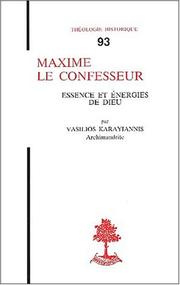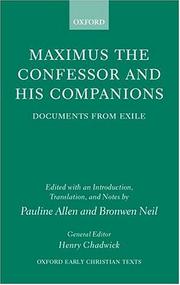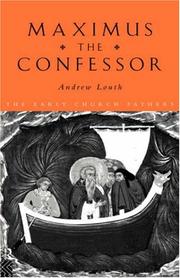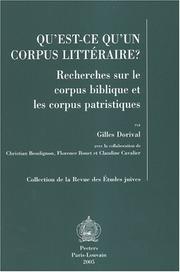Book
ISBN: 0197262929 Year: 2003 Volume: 118 Publisher: Oxford New York Auckland Published for the British Academy by Oxford University Press
Abstract | Keywords | Export | Availability | Bookmark
 Loading...
Loading...Choose an application
- Reference Manager
- EndNote
- RefWorks (Direct export to RefWorks)
Prosopography. --- Prosopographie --- Rome --- Byzantine Empire --- Empire byzantin --- History --- Biography. --- History. --- Histoire --- Biographies --- Biographie --- Offprints --- Rome (Italy) --- Prosopography --- Methodology --- Byzantium (Empire) --- Vizantii︠a︡ --- Bajo Imperio --- Bizancjum --- Byzantinē Autokratoria --- Vyzantinon Kratos --- Vyzantinē Autokratoria --- Impero bizantino --- Bizantia --- Maximus Confessor --- Maximus --- Maxime le Confesseur --- Maximus der Bekenner --- Maximus the Confessor --- Massimo il Confessore --- Maksim Ispovednik --- Maksim Spoznavalec --- Maximos Homologetes --- Maxim Mărturisitorul --- Hagios Maximos, --- Maksim, --- Makʻsime Aġmsarebeli, --- Massimo Confessore, --- Massimo il Confessore, --- Maxim, --- Maxime le Confesseur, --- Maximos Confessor, --- Maximos, --- Maximos ho Gkraikos, --- Maximos ho Homologētēs, --- Maximus Confessor, --- Maximus, --- Maximus of Constantinople, --- Sfântul Maxim,

ISBN: 2701012724 2701017076 9782701012728 Year: 1993 Volume: 93 Publisher: Paris Beauchesne
Abstract | Keywords | Export | Availability | Bookmark
 Loading...
Loading...Choose an application
- Reference Manager
- EndNote
- RefWorks (Direct export to RefWorks)
God --- Dieu --- Attributes. --- History of doctrines --- Attributs --- Histoire des doctrines --- Maximus, --- God (Christianity) --- 276 =75 MAXIMUS CONFESSOR --- -#GROL:SEMI-276-05 Maxi --- Metaphysics --- Misotheism --- Monotheism --- Religion --- Theism --- Griekse patrologie--MAXIMUS CONFESSOR --- -Maximus Confessor, Saint --- -Contributions in concept of God --- #GROL:SEMI-276-05 Maxi --- Hagios Maximos, --- Maksim, --- Makʻsime Aġmsarebeli, --- Massimo Confessore, --- Massimo il Confessore, --- Maxim, --- Maxime le Confesseur, --- Maximos Confessor, --- Maximos, --- Maximos ho Gkraikos, --- Maximos ho Homologētēs, --- Maximus Confessor, --- Maximus of Constantinople, --- Sfântul Maxim, --- Maximus Confessor --- Maximus --- Maxime le Confesseur --- Maximus der Bekenner --- Maximus the Confessor --- Massimo il Confessore --- Maksim Ispovednik --- Maksim Spoznavalec --- Maximos Homologetes --- Maxim Mărturisitorul --- God (Christianity) - History of doctrines - Early church, ca. 30-600.
Book
ISBN: 3880961395 9783880961395 Year: 1997 Volume: 5 Publisher: Sankt Ottilien Eos
Abstract | Keywords | Export | Availability | Bookmark
 Loading...
Loading...Choose an application
- Reference Manager
- EndNote
- RefWorks (Direct export to RefWorks)
Maximus, --- Gregory Palamas, --- Hagios Maximos, --- Maksim, --- Makʻsime Aġmsarebeli, --- Massimo Confessore, --- Massimo il Confessore, --- Maxim, --- Maxime le Confesseur, --- Maximos Confessor, --- Maximos, --- Maximos ho Gkraikos, --- Maximos ho Homologētēs, --- Maximus Confessor, --- Maximus of Constantinople, --- Sfântul Maxim, --- Grégoire Palamas, --- Gregor Palamas, --- Gregorio Palamas, --- Grēgorios, --- Gregorios Palamas, --- Grigorie Palama, --- Grigoriĭ Palama, --- Palamas, Gregorius, --- Palamas, Gregory, --- Maximus Confessor --- Maximus --- Maxime le Confesseur --- Maximus der Bekenner --- Maximus the Confessor --- Massimo il Confessore --- Maksim Ispovednik --- Maksim Spoznavalec --- Maximos Homologetes --- Maxim Mărturisitorul --- Gregorius Palamas ep. Thessalonic. --- Maximus, - Confessor, Saint, - ca. 580-662. --- Gregory Palamas, - Saint, - 1296-1359.
Book
ISBN: 0957748353 9780957748354 Year: 2003 Volume: 6 Publisher: Sydney St Pauls publications
Abstract | Keywords | Export | Availability | Bookmark
 Loading...
Loading...Choose an application
- Reference Manager
- EndNote
- RefWorks (Direct export to RefWorks)
276 =75 MAXIMUS CONFESSOR --- Griekse patrologie--MAXIMUS CONFESSOR --- Church history --- Church history. --- Englisch. --- Griechisch. --- Hagiografie. --- Hagiographie. --- Monothelitism --- Monothelitism. --- Übersetzung. --- Maximus, --- Maximus (Confessor). --- 600-699. --- Byzantine Empire --- Byzantine Empire. --- History --- Maximus --- Maximus Confessor --- Maxime le Confesseur --- Maximus der Bekenner --- Maximus the Confessor --- Massimo il Confessore --- Maksim Ispovednik --- Maksim Spoznavalec --- Maximos Homologetes --- Maxim Mărturisitorul --- Hagios Maximos, --- Maksim, --- Makʻsime Aġmsarebeli, --- Massimo Confessore, --- Massimo il Confessore, --- Maxim, --- Maxime le Confesseur, --- Maximos Confessor, --- Maximos, --- Maximos ho Gkraikos, --- Maximos ho Homologētēs, --- Maximus Confessor, --- Maximus of Constantinople, --- Sfântul Maxim,

ISBN: 0198299915 9780198299912 Year: 2003 Volume: *12
Abstract | Keywords | Export | Availability | Bookmark
 Loading...
Loading...Choose an application
- Reference Manager
- EndNote
- RefWorks (Direct export to RefWorks)
Monothelitism --- Monothelitisme --- Monothélitisme --- Monothelitism. --- Monothélisme --- Monophysites --- Maximus Confessor, Saint --- Monothélisme --- Kontroverse. --- Monenergismus. --- Monotheletisme. --- Monotheletismus. --- Quelle. --- Maximus, --- Geschichte 655-662. --- 276 =75 MAXIMUS CONFESSOR --- Christian heresies --- Griekse patrologie--MAXIMUS CONFESSOR --- History --- Hagios Maximos, --- Maksim, --- Makʻsime Aġmsarebeli, --- Massimo Confessore, --- Massimo il Confessore, --- Maxim, --- Maxime le Confesseur, --- Maximos Confessor, --- Maximos, --- Maximos ho Gkraikos, --- Maximos ho Homologētēs, --- Maximus Confessor, --- Maximus of Constantinople, --- Sfântul Maxim, --- Church history --- Eglise --- Hérésies chrétiennes --- Sources --- Histoire --- Maximus Confessor --- Maximus --- Maxime le Confesseur --- Maximus der Bekenner --- Maximus the Confessor --- Massimo il Confessore --- Maksim Ispovednik --- Maksim Spoznavalec --- Maximos Homologetes --- Maxim Mărturisitorul
Book
ISSN: 0920623X ISBN: 9789004399747 9004399755 9789004399754 9004399747 Year: 2019 Volume: 152 Publisher: Leiden Boston Brill
Abstract | Keywords | Export | Availability | Bookmark
 Loading...
Loading...Choose an application
- Reference Manager
- EndNote
- RefWorks (Direct export to RefWorks)
In The Concept of Unity as the Principle of Coherence in Maximus Confessor Jonathan Bieler lays out the importance of the concepts of transcendent divine unity, goodness and truth for understanding the coherence of the whole of Maximus’ thought, which brings together theology, anthropology and Christology into a unified vision that is based on an analogy between creator and creation. Interpreting the concepts of Maximus’ thought remains a contentious subject in Maximian scholarship. By evaluating the interior coherence and historical situation of Maximus’ thought in general and by studying the influence of Ps-Dionysius the Areopagite’s methodology on Maximus’ Christology in particular the author shows the context in which Maximus’ well-known conceptual distinctions can be understood in a helpful way. Jonathan Bieler erläutert in Der Einheitsbegriff als Kohärenzprinzip bei Maximus Confessor die zentrale Rolle der Begriffe der göttlichen Einheit, Güte und Wahrheit für ein Verständnis der Kohärenz von Maximus’ Denken, das Gotteslehre, Anthropologie und Christologie zu einer einheitlichen Sicht versammelt, beruhend auf einer Analogie zwischen Schöpfer und Geschöpf. Die Interpretation von Maximus’ Konzepten ist ein umstrittenes Gebiet in der Forschung. Durch eine Auswertung der inneren Kohärenz und der historischen Situation des Maximus und durch eine Untersuchung des Einflusses, den Ps-Dionysius Areopagitas Methodik auf die Christologie des Maximus ausgeübt hat, zeigt der Autor den Kontext auf, in dem Maximus’ begriffliche Unterscheidungen auf eine hilfreiche Weise verstanden werden können.
Maximus, --- 276 =75 MAXIMUS CONFESSOR --- 276 =75 MAXIMUS CONFESSOR Griekse patrologie--MAXIMUS CONFESSOR --- 276 =75 MAXIMUS CONFESSOR Patrologie grecque--MAXIMUS CONFESSOR --- Griekse patrologie--MAXIMUS CONFESSOR --- Patrologie grecque--MAXIMUS CONFESSOR --- Maximus Confessor --- Maximus --- Maxime le Confesseur --- Maximus der Bekenner --- Maximus the Confessor --- Massimo il Confessore --- Maksim Ispovednik --- Maksim Spoznavalec --- Maximos Homologetes --- Maxim Mărturisitorul --- Hagios Maximos, --- Maksim, --- Makʻsime Aġmsarebeli, --- Massimo Confessore, --- Massimo il Confessore, --- Maxim, --- Maxime le Confesseur, --- Maximos Confessor, --- Maximos, --- Maximos ho Gkraikos, --- Maximos ho Homologētēs, --- Maximus Confessor, --- Maximus of Constantinople, --- Sfântul Maxim, --- Maximus, - Confessor, Saint, - approximately 580-662.
Book
ISBN: 2503600832 9782503600833 9782503600840 Year: 2022 Publisher: Turnhout Brepols
Abstract | Keywords | Export | Availability | Bookmark
 Loading...
Loading...Choose an application
- Reference Manager
- EndNote
- RefWorks (Direct export to RefWorks)
Opuscula theologica et polemica is a collection of minor works of Maximus the Confessor that has not received much scholarly attention so far. Nevertheless, it offers A unique insight into the Christological and personological universe of the Christian thinker. The present volume is the first attempt to bring together scholars of different traditions and to apply different approaches - theological, philosophical, philological and historical - to this seminal work.
Theology, Doctrinal --- 276 =75 MAXIMUS CONFESSOR --- 276 =75 MAXIMUS CONFESSOR Griekse patrologie--MAXIMUS CONFESSOR --- 276 =75 MAXIMUS CONFESSOR Patrologie grecque--MAXIMUS CONFESSOR --- Griekse patrologie--MAXIMUS CONFESSOR --- Patrologie grecque--MAXIMUS CONFESSOR --- Christian doctrines --- Christianity --- Doctrinal theology --- Doctrines, Christian --- Dogmatic theology --- Fundamental theology --- Systematic theology --- Theology, Dogmatic --- Theology, Systematic --- Theology --- History --- Doctrines --- Maximus --- Maximus Confessor --- Maxime le Confesseur --- Maximus der Bekenner --- Maximus the Confessor --- Massimo il Confessore --- Maksim Ispovednik --- Maksim Spoznavalec --- Maximos Homologetes --- Maxim Mărturisitorul --- Hagios Maximos, --- Maksim, --- Makʻsime Aġmsarebeli, --- Massimo Confessore, --- Massimo il Confessore, --- Maxim, --- Maxime le Confesseur, --- Maximos Confessor, --- Maximos, --- Maximos ho Gkraikos, --- Maximos ho Homologētēs, --- Maximus Confessor, --- Maximus, --- Maximus of Constantinople, --- Sfântul Maxim,
Book
ISBN: 2503600859 9782503600857 9782503600864 Year: 2023 Publisher: Turnhout Brepols
Abstract | Keywords | Export | Availability | Bookmark
 Loading...
Loading...Choose an application
- Reference Manager
- EndNote
- RefWorks (Direct export to RefWorks)
This book offers an investigation into the basic structures of St Maximus the Confessor’s thought in the context of ancient and late antique philosophy. The introduction explains what is meant by the term ‘metaphysics of Maximus’, and discusses possible senses of terms like ‘Christian philosophy’ and ‘Byzantine philosophy’. On the background of a definition of ‘Christian philosophy’, the author devotes two chapters to discuss Maximus’ ideas of knowledge of the created world and of God. The chapters that follow are devoted to the doctrine of creation, the function of the so-called logoi (divine Ideas) in the procession and conversion of the totality of beings in relation to God, and the relation between the logoi and the so-called divine activities. The logoi, eternally comprised in God’s knowledge as the divine thoughts in accordance with which everything is created, are then shown to function as principles of a rather complex order of being: the cosmos instituted as a whole-part system. This whole-part system secures the possible communion between all creatures and facilitates the conversion of everything to the divine source as a unity in plurality deified by God. The last chapter treats of the doctrines of Incarnation and deification in order to clarify the exact sense of deification for all beings. In the final part of the book, the author applies Maximian metaphysics to a major ethical challenge in our days: the environmental crisis, thus proving that late antique philosophy still has relevance today.
276 =75 MAXIMUS CONFESSOR --- 276 =75 MAXIMUS CONFESSOR Griekse patrologie--MAXIMUS CONFESSOR --- 276 =75 MAXIMUS CONFESSOR Patrologie grecque--MAXIMUS CONFESSOR --- Griekse patrologie--MAXIMUS CONFESSOR --- Patrologie grecque--MAXIMUS CONFESSOR --- Maximus --- Maximus Confessor --- Maxime le Confesseur --- Maximus der Bekenner --- Maximus the Confessor --- Massimo il Confessore --- Maksim Ispovednik --- Maksim Spoznavalec --- Maximos Homologetes --- Maxim Mărturisitorul --- Hagios Maximos, --- Maksim, --- Makʻsime Aġmsarebeli, --- Massimo Confessore, --- Massimo il Confessore, --- Maxim, --- Maxime le Confesseur, --- Maximos Confessor, --- Maximos, --- Maximos ho Gkraikos, --- Maximos ho Homologētēs, --- Maximus Confessor, --- Maximus, --- Maximus of Constantinople, --- Sfântul Maxim,

ISBN: 0415118468 041511845X Year: 1996 Volume: *1 Publisher: New York ; London Routledge
Abstract | Keywords | Export | Availability | Bookmark
 Loading...
Loading...Choose an application
- Reference Manager
- EndNote
- RefWorks (Direct export to RefWorks)
St. Maximus the Confessor, the greatest of the Byzantine theologians, lived through the most catastrophic period the Byzantine Empire was to experience before the Crusades. This book introduces the reader to the times and upheavals during which Maximus lived. It discusses his cosmic vision of humanity and the role of the church. The study makes available a large number of Maximus' theological treatises, many of them translated for the first time, which are accompanied by lucid and informed introductions. 'Maximus the Confessor' provides a much needed introduction to the theology of Maximus, as well as direct access to his profound but often difficult thought.
Maximus [Confessor] --- Theology, Doctrinal --- Théologie dogmatique --- History --- Histoire --- Maximus, --- 276 =75 MAXIMUS CONFESSOR --- Griekse patrologie--MAXIMUS CONFESSOR --- Théologie dogmatique --- Christian doctrines --- Christianity --- Doctrinal theology --- Doctrines, Christian --- Dogmatic theology --- Fundamental theology --- Systematic theology --- Theology, Dogmatic --- Theology, Systematic --- Theology --- Doctrines --- Hagios Maximos, --- Maksim, --- Makʻsime Aġmsarebeli, --- Massimo Confessore, --- Massimo il Confessore, --- Maxim, --- Maxime le Confesseur, --- Maximos Confessor, --- Maximos, --- Maximos ho Gkraikos, --- Maximos ho Homologētēs, --- Maximus Confessor, --- Maximus of Constantinople, --- Sfântul Maxim, --- Maximus Confessor --- Theology [Doctrinal ] --- Byzantine Empire --- Primitive and early church, ca. 30-600 A.D. --- Maximus, - Confessor, Saint, - ca. 580-662. --- Theology, Doctrinal - Byzantine Empire. --- Theology, Doctrinal - Early church, ca. 30-600. --- Maximus --- Maxime le Confesseur --- Maximus der Bekenner --- Maximus the Confessor --- Massimo il Confessore --- Maksim Ispovednik --- Maksim Spoznavalec --- Maximos Homologetes --- Maxim Mărturisitorul

ISBN: 9042916338 2877238768 9782877238762 9789042916333 Year: 2005 Volume: 35 Publisher: Paris Louvain Dudley, MA Peeters
Abstract | Keywords | Export | Availability | Bookmark
 Loading...
Loading...Choose an application
- Reference Manager
- EndNote
- RefWorks (Direct export to RefWorks)
Qu'est-ce qu'un corpus littéraire? A cette question qui intéresse la littérature générale, les données littéraires antiques, notamment bibliques et patristiques, permettent d'apporter quelques éléments de réponse. Le corpus ne se définit pas par la présence d'un titre et d'une attribution d'auteur, car toute oeuvre littéraire est normalement pourvue de telles indications. Il se caractérise d'abord par un nombre: il comprend un nombre fixe d'éléments, qui donne lieu à discussion: y-a-t-il 22 ou 24, 44 ou 45 livres de l'Ancien Testament? Les données recueillies ici à propos du livre d'Esther (Claudine Cavalier) ou dans les «Synopses» sur la Bible (Gilles Dorival) mettent en valeur les enjeux de ces discussions. Le corpus se définit ensuite par un ordre déterminé: dans la Bible, la Genèse précède l'Exode, qui précède lui-même le Lévitique, lequel est avant les Nombres, le Deutéronome, Josué, les Juges, Samuel et les Rois, etc. L'interprétation de l'ordre des corpus n'est pas chose aisée et des recherches restent à mener dans ce domaine. Un troisième élément de définition est que le corpus littéraires peuvent comporter des sous-corpus, c'est-à-dire des corpus internes au corpus de départ: par exemple, la Bible a d'abord été divisée en Loi et Prophètes, puis en Loi, Prophètes et Écrits; d'autres tentatives de division et de classification du corpus biblique sont attestées, notamment dans la «Synopse» de Jean Chrysostome. Des phénomènes de circulation entre les sous-corpus se font jour: Esther représente un cas singulier de ce point de vue. Enfin, dans le cas du livre des psaumes et des collections dont il est fait, faut-il se contenter de parler de sous-corpus? Ne faut-il pas introduire d'autres notions? Les cantiques des degrés apportent un éclairage sur ce point (Florence Bouet). Un dernier élément de définition des corpus littéraires doit être pris en compte: ils ont donné lieu à des explications orales (cours et homélies) et écrites (scholies et commentaires). Ce phénomène est bien connu dans le cas de la Bible, avec la mise par écrit de la loi orale dans la Mishna et les Talmuds. Mais il est aussi attesté dans le cas des Pères de l'Église, comme le montre l'exemple du Pseudo-Denys (Christian Boudignon). Trois jeunes chercheurs ont collaboré avec Gilles Dorival pour la rédaction de ce livre.
Christian literature, Early --- Littérature chrétienne primitive --- History and criticism. --- Histoire et critique --- Bible --- Criticism, interpretation, etc. --- 22 --- 276 --- La Bible. Ecriture sainte. Livres sacres --- Patrologie. Patristique --- Chapters --- Littérature chrétienne primitive --- History and criticism --- Biblia --- Maximus Confessor --- Pseudo-Dionysius --- pseudo-Dionysius Areopagita --- Dionysius Areopagita --- Denys l'Aréopagite --- Denys the Areopagite --- Dionysius de Areopagiet --- Dionysius --- Pseudo-Dionysius, --- Maximus --- Maxime le Confesseur --- Maximus der Bekenner --- Maximus the Confessor --- Massimo il Confessore --- Maksim Ispovednik --- Maksim Spoznavalec --- Maximos Homologetes --- Maxim Mărturisitorul --- Hagios Maximos, --- Maksim, --- Makʻsime Aġmsarebeli, --- Massimo Confessore, --- Massimo il Confessore, --- Maxim, --- Maxime le Confesseur, --- Maximos Confessor, --- Maximos, --- Maximos ho Gkraikos, --- Maximos ho Homologētēs, --- Maximus Confessor, --- Maximus, --- Maximus of Constantinople, --- Sfântul Maxim, --- Christian literature, Early - History and criticism. --- Dionigi, --- Dionisiĭ, --- Dionisio, --- Dionysios, --- Dionysius Areopagita, --- Dionysius Mysticus --- Dionysius, --- Pseudo-Denys, --- Pseudo-Dionigi, --- Pseudo-Dionisiĭ, --- Pseudo Dionisio, --- Psevdo-Dionise, --- Psevdo-Dionisii︠a︡,

 Search
Search Feedback
Feedback About
About Help
Help News
News